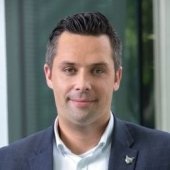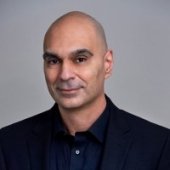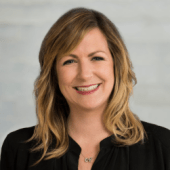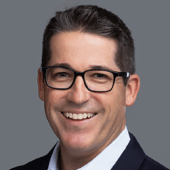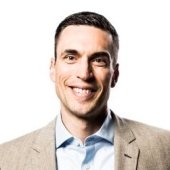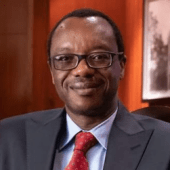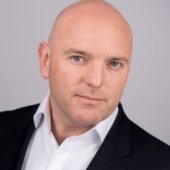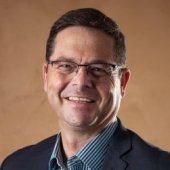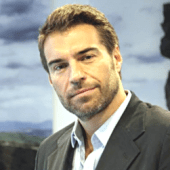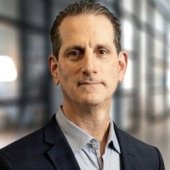Talent trends 2030 with Mauro Ghilardi, A2A’s people and transformation officer
IN BRIEF
- 5:25 - The key word for the next decade is going to be adaptability, the “ability to change fast and to react fast.” And the culture of the future that I imagine is a culture founded on principles, on values, but also, at the same time, to be able to quickly move and quickly adapt and incorporate new ways of doing business and new ways of thinking.
- 13:55 - Collaboration is in short supply in the world. I do see most of the companies struggling with having people working together and having the ability to find people that are generally passionate about working with others and delivering results through others with others. Collaboration is key today, and it’s going to be key 10 years from now.
- 15:56 - As business leaders, we need to be brave and not strive for just incremental change, but look for big, revolutionary changes, because by doing that, you are producing a better result for your company.
In this video, Joe Kornik, Editor-in-Chief of VISION by Protiviti sits down with Mauro Ghilardi, Chief People and Transformation Officer at A2A, to discuss people and the future of work. A2A, a Milan-based life company focused on the environment, water and energy, has more than 13,000 employees and Ghilardi is in charge of the human resources procurement and group shared-services activities. A2A aims to improve the quality of life of its customers, the public and its workforce with the mindset on the planet’s future.
Talent trends 2030 with Mauro Ghilardi, A2A’s people and transformation officer
Joe Kornik: Welcome to the VISION by Protiviti interview. I’m Joe Kornik, Editor-in-Chief of VISION by Protiviti, our content initiative where we examine strategic implications of big topics that will impact business, the C-suite and executive boardrooms worldwide over the next decade and beyond.
Today, we’re exploring the future of work and all its implications for employees and employers as well as for clients and customers. We’ve got an outstanding guest today as we welcome Mauro Ghilardi, chief people and transformation officer at A2A, where he is in charge of the human resources procurement and group shared-services activities. A2A is a Milan-based life company focused on the environment, water and energy, with more than 13,000 employees. A2A aims to improve the quality of life of its customers, the public and its workforce with the mindset on the planet’s future. Mauro, thank you so much for joining me today.
Mauro Ghilardi: Thank you, Joe. Thanks for inviting me. Pleasure to be here.
Joe Kornik: I’m excited to be able to talk to you today about people and transformation and the future of work, but first, I’m not sure all of our viewers are familiar with A2A, so can you give us a brief overview of the company and your role as people and transformation director?
Mauro Ghilardi: We are an over-13,000-people company. We are dealing with services like energy production and sales. We are dealing with the cleaning of our streets and our cities and then transforming that garbage that we all produce into clean energy. We deal with water services, provide services to the city and the communities we serve. We are mainly based in the north of Italy. We are a Italian national company, but our center is really in the city of Milan and Brescia, where we originated from many years ago.
My role as people and transformation officer is around all the HR aspects and organizational aspects of the job. We call it transformation because we put together services and functions like procurement, which is vital for delivery of our services and our business plan, and the group shared services, which is basically all the back office that provide transactional services to all of our clients and all of our employees.
Joe Kornik: Excellent. So in your role, you’re obviously focused on people and all the various aspects that go into people as they work at a corporation. So as you look ahead to 2030 and beyond, how concerned are you about the looming global talent and skill shortage that we’ve all been hearing a lot about, and what can be done to prepare for the brain drain that may occur over the next decade and beyond?
Mauro Ghilardi: Everybody that is in business, they should be very concerned. The disaffection of a new generation into the classic corporation environment. The fact that we have a lot of brains which are not in the geographic areas where we are residing, and I have to say I’m also concerned about the hands drain. So, the challenge for a company like mine is at the same time to not have enough brains but also not to have enough people on the streets, people that are doing the real job. So, we are definitely concerned. We need to have a better way to link new generations and schools and universities into the corporate world.
As far as Italy’s concerned, as an example, we have a tremendous amount of people who are the so-called NEET — they’re not in education or in training and not employed. We have a large amount of our potential workforce which in fact is not there. The other element is our inability to transform, internally, our company’s employees into a new workforce. The two things that I’m looking at are, how do I better attract the new generation and talent into my workforce, and how do I transform my employees into something which is still employable in our company or eventually elsewhere?
Joe Kornik: That’s interesting. I know another big aspect of your role is culture, which has taken a pretty significant hit during the pandemic. How can culture companies — that is, firms that have historically had an advantage because they are just simply great places to work — ensure that they don’t lose that advantage, that differentiator, as we move forward into a totally new work reality in the future?
Mauro Ghilardi: Culture is a fascinating element of my role, obviously, and we’ve been lucky to redefine ourselves as a life company. I will tell you in a second why we consider ourselves as a life company, but that sense of culture is strengthening us very much to the ground, to the basis of our ethos, to why we are in business. But I do think of a cultural company potentially becoming a disadvantage for many of them, because culture tends to be very monolithic, very static. And the keyword for the next decade is going to be adaptation, is going to be adaptability, is going to be “ability to change fast and to react fast.” And the culture of the future that I imagine is a culture founded on principles, on values, but also, at the same time, to be able to quickly move and quickly adapt and incorporate new ways of doing business and new ways of thinking. Adaptability, to me, is the key for the next decade.
Joe Kornik: That sounds like a big challenge for the corner offices — for those who that are in power — to be able to be nimble and to be able to move along those lines that you mentioned. Along those same lines, we can talk about employee engagement, because that’s a key factor as we move forward as well. How can those business leaders make sure their employees are invested in the company’s values, the purpose? Do you think alignment on those values and purpose will be more important in the future as we look to work in, say, 2030 and beyond?
Mauro Ghilardi: Yes, there is a definite trend. I’ve been in business for way too many years, as my gray hair suggests, and I remember the days in which we were looking at the statistics and demographic research, and it was telling us that the new generation at that time — I was in that generation, probably — was looking at companies which are more solidly rooted into values and do good things, and this is becoming more and more relevant.<>Imagine the famous letter of Larry Fink 20 years ago. This was unbelievably bold to think of. We, as a company, we owe to ourselves, to our future, to have a solid grounded principle, solid grounded values, and that’s why, as a company, we call ourselves a life company. The reason is very simply because we deal with the element of life. We deal with the earth, with the ground, we deal with energy or fire, we deal with water, and we deal with air. We do manage these types of element, and this has helped us in keeping our engagement level very high. It’s easy for us to tell our employees that whatever they do, the way they do their business, is going to be good for their families, for their communities, for future generations, because the way we deal with that is going to be important 50, 100, 200 years from now.
Now, we are lucky because we are in that type of business. There are other companies in which the connection between values or community or environment is much more looser. But that’s the way companies should need to think — how they can connect to a bigger purpose — because that’s the way that people feel engaged. Again, this is true for the 20-year-old people and the 60-year-old people. This is true for everybody, because the 20s are thinking of their own families, and the 60s are thinking of their grandchildren, eventually. That’s a connection that can go through generations as well.
Joe Kornik: It sounds like that could be a real differentiator for A2A if you’ve got purpose and values already built into your mission statement, essentially. Everything I’ve read says that this next generation, and even the generation after that, will be a lot more engaged in terms of the type of work they’re doing — not just a job for a paycheck or for healthcare benefits or whatnot, but they’ll be engaged in the actual work they’re doing. That’s a real differentiator for your company. Do you see it that way as well?
Mauro Ghilardi: I do see it that way. Plus, I do see the accountability that comes with it. When, last year, we defined ourselves as a life company, I was thinking, “If we do something wrong” —and in business, things might go wrong, especially in some types of business — “how do we judge ourselves, how will the people judge us as the leader of this company,” because if you are a normal company, it’s bad enough. But if you are a life company and something happens to you, it’s much worse. The bar was lifted very high, and this gives us much more accountability and responsibility over what we do.
At the same time, it motivates our people much more, and when I talk, I go around in the virtual corridor these days, and I hear more and more people proud of what we do and feeling more engaged and more attached. Joe, I often refer to, especially in Italy, the concept of family — a company that is a mother or is a family is always referred to as a good way of things. I do like to think that companies should be more as a club — a club in which you decide to go, and you decide to stay, because you like the members and you like the purpose of the club. A family is, no matter what, good or bad, something you don’t choose — it is something that you have, especially your originating family. So, I like to think of company as a club, and A2A has to be a club in which people decide to come, decide to stay and decide to engage with. And having a strong sense of values and purpose definitely helped to build that club.
Joe Kornik: I would think that’s a big advantage, and one of the big challenges right now, as you know, worldwide is retention. All of that is a huge issue for HR managers and business leaders. We’re living through the Great Resignation right now, and all signs indicate that younger workers will continue to switch jobs and even careers frequently. That’s a growing trend when we talk about the future of work, career shifts and switching careers midway through. That’s got to be a huge challenge. Is there a playbook to navigate that?
Mauro Ghilardi: If I had a playbook, I would be here interviewing about my next book. No, I do have a few basic suggestions. One is to be brave as a company and to strive for excellence in the broader sense. Another one is to select your people according to your same values, and don’t be afraid of difference of opinion. The core and the values have to be the same in my mind, but people have to be able to express themselves in different ways. The other thing is to have, as much as possible, fluidity internally in careers — to allow people to look for that switch of careers that they cannot do internally, and they go outside to do that. How many times do we have people who are changing jobs completely and go to a new company, and you say, “Well, I wish I had known. I wish I could offer that person the same opportunity inside.”
The other thing is, when people are leaving you — and it’s not about only about alumni and things like that — expanding the reach of your company beyond your company limit and, in a way, to be able to collaborate with some of these people, to some of the ecosystem around you in a different way. We have a problem in delivering our numbers not only because of our inability to have enough talent inside but also the inability to have the talented people and companies around us too, because we don’t do everything internally. So, the ability to create that ecosystem and to have a fluctuation and the fluidity between internal and external in your ecosystem is another key to retain talent.
Joe Kornik: And retaining talent is one piece of it, but you mentioned switching careers, and eventually, you will have to find new employees, I’m sure. Growing companies always need new lifeblood — employees are the lifeblood. So, as you do have to recruit and find new employees or retain existing ones, what capabilities, what skill sets, do you think will be in high demand, let’s say, a decade from now, and how is that different from today?
Mauro Ghilardi: Let me tell you something which maybe the listeners will be surprised by. I don’t want to venture to say what is going to be the next specific skill in the next decade. If you look back 10 years ago, who would be able to say that the keywords of 2022 would have been sustainability, digitalization and all these things. This word probably didn’t even exist 10 years ago. What I’m looking at is collaboration. Collaboration is in short supply in the world. I do see most of the companies struggling with having people working together and having the ability to find people that are generally passionate about working with others and delivering results through others with others. It’s a key thing. Collaboration is going to be key today. It is key today, and it’s going to be key 10 years from now.
Curiosity and ability to learn is the other key thing, because we don’t know what is going to happen 10 years from now. You know, people are eager to learn, and the company has to be able to keep that eagerness and that curiosity alive. Often, we just box people and leave it there, and people come in with their brain in the morning and put it in a locker, don’t use it through the day and pick it back up again. That ability to have people that want to keep that brain alive and a company that allows them to do that are the two things that I would look at.
Joe Kornik: Interesting. I have one more question, and I’ll let you off the hook unless you have any bold predictions you’d like to make for the future, which we always do welcome here at Vision by Protiviti. As you look to 2030 and beyond as it relates to people, talent and transformation, obviously, is there a call to action for executives? What’s your best advice that you could offer business leaders as they look at their own organizations and think out to 2030, 2035, when it comes to people, talent and transformation?
Mauro Ghilardi: There was a famous address of a guy who is gone by now, which was telling young graduates, “Be hungry. Stay foolish.” I would tell my fellow leaders here to be brave, because I tell the new generation to be exigent. When I go and do this similar speech to the new grads or new kids coming to work, I say, “Be exigent — be very exigent with us. Choose your company wisely, and help us to become better.” As a business leader, we need to be brave and not strive for just incremental change, but look for big, revolutionary changes, because by doing that, you are producing a better result for your companies. You are taking risk in the business. Look at the past 10 years. Look at the last two years. Who would have imagined — we are in the energy business — that energy costs would have soared so much? If you’re not brave enough, if you’re not quick enough in reacting, you’re going to be out of business in the blink of an eye.
Joe Kornik: Thank you so much for that. Any bold predictions before I let you go? I like to ask people if in 10 years’ time, will people be more satisfied with their jobs? Will people be happier employees? Will they be more engaged? That would be the goal, that would be the dream, and some people are today, but I would love to get to a place where more people are. Are you optimistic about the future in that sense?
Mauro Ghilardi: I am very optimistic about the future, but that’s because the way I am. If I look back at the past 10 years, things have changed dramatically. If I look at the people I know, they have shifted jobs so frequently — myself as well. I’m happy about the way companies are working, because it seems to me that companies are taking more and more accountability on things where the government and the society have left empty spaces. We, as a company, are more accountable. Because of that, and because we know that we need to keep our people engaged and happy, I’m very optimistic about that. It’s going to be difficult, definitely, but there is much more opportunity by doing that than by not doing it. Yes, I am very optimistic.
Joe Kornik: Excellent. What a great way to end our time together. Mauro, thank you so much for those insights and for that look inside A2A as far as people and transformation goes. Fascinating discussion, and thank you for joining us at home on the VISION by Protiviti interview. We’ll see you next time.
Did you enjoy this content? For more like this, subscribe to the VISION by Protiviti newsletter.


